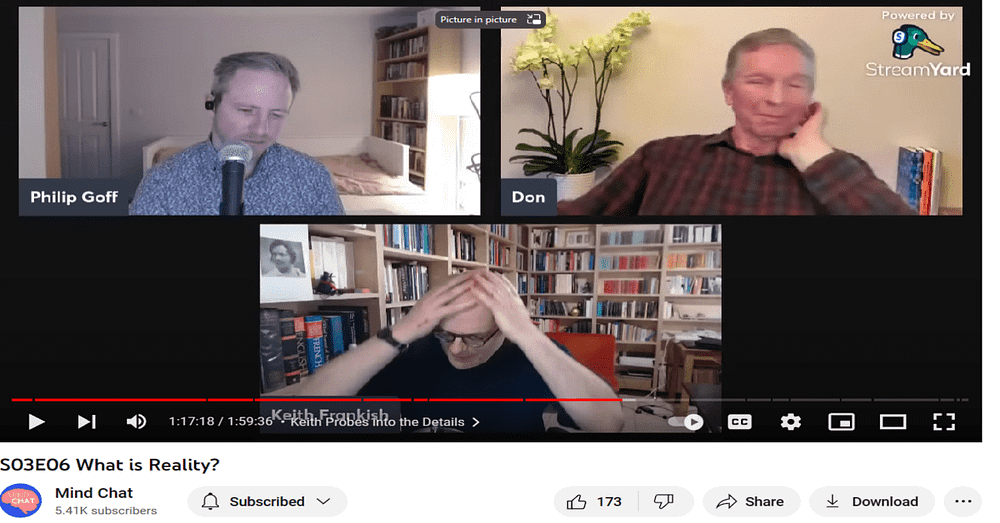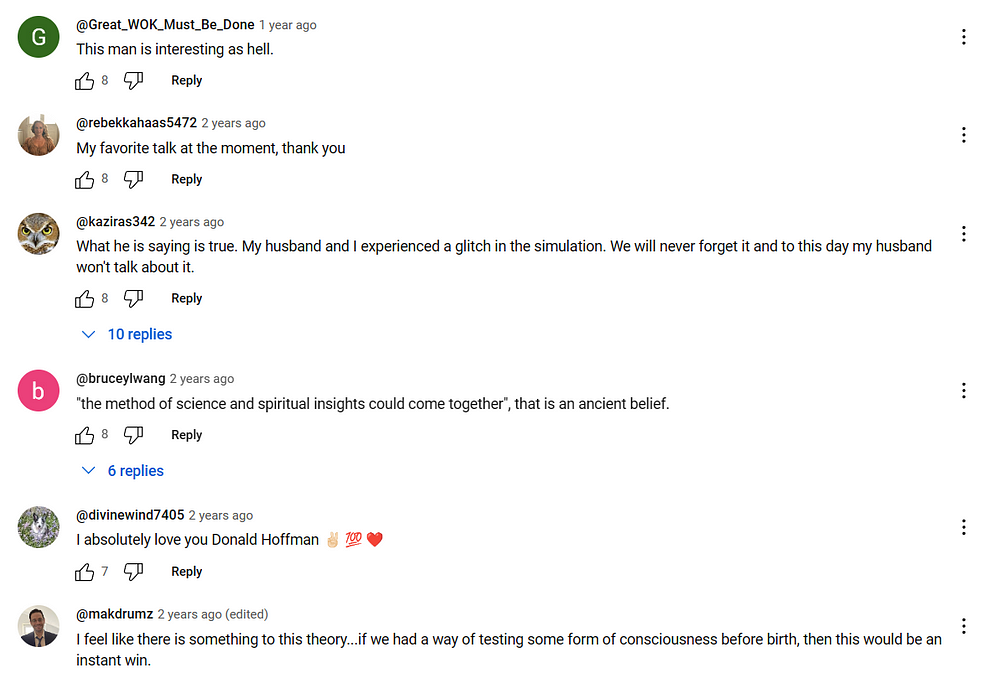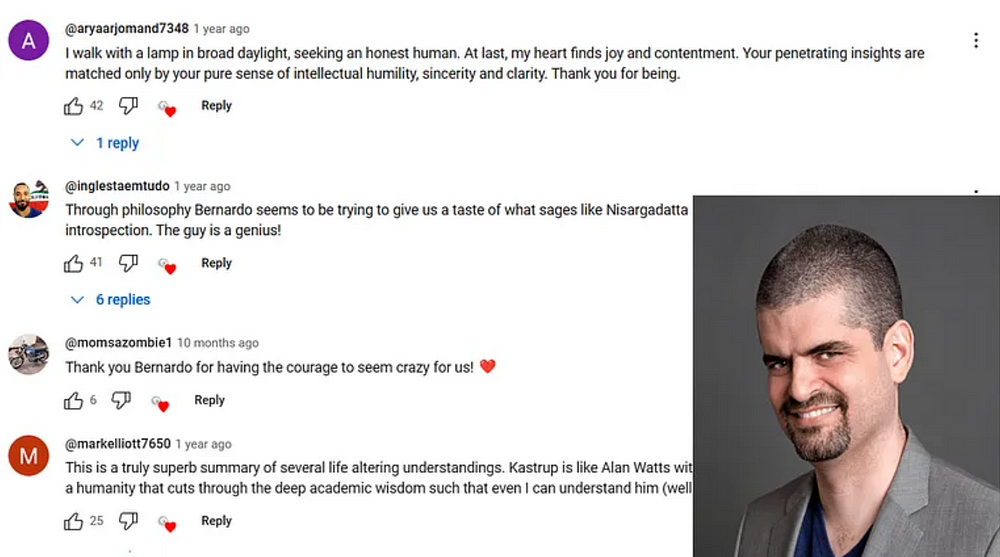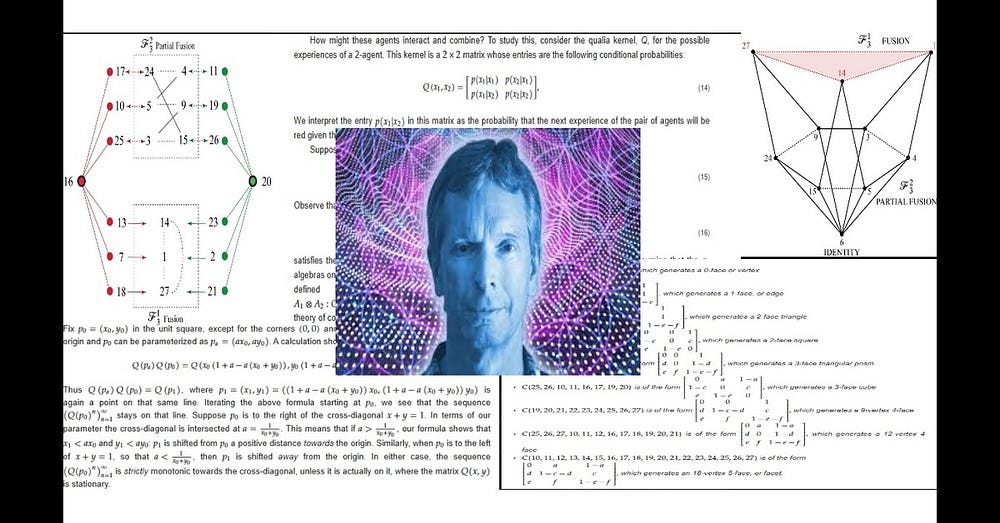This is a response to watching a YouTube video called ‘What is Reality?’, in which Professor Donald Hoffman discusses his commitment to the “spacetime is doomed” idea with the philosophers Philip Goff and Keith Frankish… I was already convinced that there was something deeply suspect about Hoffman’s presentations of his philosophical ideas. However, this video interview convinced me that using the word “charlatan” about him is fully justifiable. Indeed, Hoffman’s stuff about Cantor’s infinities and Gödel was the last straw!

This is the introduction to Philip Goff and Keith Frankish’s interview with Donald Hoffman (which was streamed live on YouTube on May 22, 2023):
“Donald Hoffman is a cognitive scientist at UC Irvine and author of ‘The Case Against Reality.’ He believes that the world we experience is an illusion, whilst ultimate reality is composed of networks of conscious agents. Keith and Philip will probe Professor Hoffman’s view from their very different perspectives on the nature of consciousness.”
I’ve never known anyone who uses so much technical jargon (i.e., from mathematics and physics) in such a short space of time as Donald Hoffman. This has been called the “Deepak Chopra phenomenon” by some commentators. (Deepak Chopra is also an idealist and colleague of Hoffman - see here.)
What makes this even worse is that much of Hoffman’s jargon is his own. Indeed, that’s even the case when he uses established technical terms from physics, cosmology and mathematics. That’s because Hoffman often uses such terms in his own particular philosophical (or even spiritual) ways.
Thus, Hoffman luxuriates in technical terms.
[This also explains that extremely large amount of maths in his 2023 paper ‘Fusions of Consciousness’.]
And it’s easy to see why he does so.
If Hoffman were to explain things in plain language, then his entire idealist philosophy would simply go up in smoke.

So it’s odd that so many laypeople (i.e., non-scientists and non-philosophers) are so impressed by Hoffman.
As evidence of this, simply read the copious sycophantic replies after his interviews on YouTube. (I’ve never noted anything like this with other scientists and philosophers, though there’ll be rare exceptions.) Indeed, just like Deepak Chopra and Bernardo Kastrup (also a spiritual idealist), this is because these people are seen as gurus (see here), “spiritual leaders” or even prophets by their many fans.


Other laypeople may be in awe of Hoffman precisely because of his excessive use of sexy and titillating jargon from theoretical physics and mathematics (again, just like Deepak Chopra).

Hoffman is also a godsend to those editors and journalists (of newspapers and magazines) who know how to sniff out sexy and titillating “science stories” (see here). What’s more, interviewers on YouTube are also gobbling this stuff up, despite that fact that almost all them are non-scientists and non-philosophers.

So what about Keith Frankish and Philip Goff and their own interview, ‘What is Reality?’?
This is a rare example of an interview of Hoffman that isn’t carried out by an obsequious fan. That may be partly because it’s more of a discussion (or debate) than an actual interview. In other words, unlike most of the other interviews of Hoffman on YouTube, Goff and Frankish don’t simply allow Hoffman to express his categorical and absolute — if also highly technical — claims without any challenge. (I’ve lost count of the many interviews of Hoffman in which the interviewer seems to be starstruck by Hoffman’s technicalese.)
That said, it does seem that both Frankish and Goff (especially Frankish) allow Hoffman far too much leeway. Perhaps that’s because, like so many others, they were partially blinded by Hoffman’s indulgent and gratuitous use of technical terms from mathematics and theoretical physics.
In terms of the interview itself. I would guess that Frankish agrees with me about Hoffman’s verbal flux (although I could be wrong). However, Frankish is too nice a person to express the plain truth about Hoffman. In this particular video, then, Hoffman’s stuff about Cantor’s infinities and Gödel was the last straw for me, and that seemed to be the case for Frankish too. (Frankish laughs when Hoffman inevitably mentions Gödel. See the non-ironic ‘Incompleteness explains everything. Kurt Gödel’s legacy’.)
In any case, there are all sorts of philosophers I disagree with, yet I still largely understand them.
Take Philip Goff himself.
I understand almost everything he says and writes. And I also disagree with much of what he says and writes.
Similarly, both Goff’s take on panpsychism and Frankish’s take on illusionism have been deemed to be extreme theories. However, the point being made about Hoffman isn’t that his brand of idealism is too radical or extreme: it’s that he’s… well, a charlatan.
Think about this.
Before 2022, Hoffman’s main sexy theme was “reality is an illusion”. Now it’s “spacetime is doomed”. Of course, Hoffman has managed to splice these two sexy themes together. That said, he only picked up on spacetime being doomed around 2016. Yet he’s been an idealist since at least 1988.
Thus, it’s not surprising that professional philosophers and professional physicists (or scientists generally) — i.e., outside those who actually work with him — don’t take note of Hoffman’s work. (This doesn’t apply to his older books and papers in cognitive psychology.)
**********************************
Viewer Responses to the Hoffman Interview

Anon X (@anonxnor):
“When a cognitive psychologist is talking a lot about fundamental physics to make his argument, it makes me very skeptical.
“Hoffman repeatedly says ‘the physicists,’ but when he is asked, at 1:48:55, whether experts in the relevant fields agree or disagree with him, he admits that most experts disagree with him. Yet he says things like ‘the physicists are telling us that spacetime is doomed’ to justify his views. It would be more honest to say ‘some physicists are telling us that spacetime is doomed.’ By the same token, he shouldn’t say ‘the math tells us that ____’ or ‘evolutionary game theory tells us that ____’ if those claims are based only on his own work, and many relevant experts in the field of evolutionary game theory disagree that the work he has done there is correct.
“He should of course defend his work, but he shouldn’t claim that ‘the math’ tells us anything, instead he should say ‘my math’ tells us something. []
“From an outside perspective, which is the perspective of all of us listening to this, we should assume that the majority of experts is more likely to be correct, than Hoffman, about specific claims he makes within fields of scientific expertise. But I still find his overall view very interesting and worth taking seriously!”
It’s a good thing that someone else has picked up on this.
In another YouTube interview (‘What’s beyond spacetime?’), Donald Hoffman also kept on saying that “physicists” (i.e., in the plural) are saying this and saying that. (Hoffman also keeps on using the definite article — as in “the physicists”.)
Hoffman often means one particular theoretical physicist — Nima Arkani-Hamed. To be careful, perhaps Hoffman also has in mind a handful of other theoretical physicists who fully endorse what Arkani-Hamed has had to say on this highly-technical and abstract field of theoretical physics.
What’s more, even the small number of theoretical physicists who also believe that “spacetime is doomed” don’t do so in precisely the same way in which Arkani-Hamed does.
So when Hoffman uses the word ”physicists” to back up his philosophical idealism, he basically means a small number — or even a single — theoretical physicist.
Anon X:
“The difference between my math and ‘the math’ is that I could have done my math wrong. If experts in relevant fields don’t mostly agree with Hoffman’s math, his math might be wrong.”
In Hoffman’s 2023 paper ‘Fusions of Consciousness’, maths is used in two ways.
(1) As virtual verbatim quotes of the maths of (parts of) standard mathematical physics. (For example, Hoffman uses the mainstream equations of uncertainty in his paper.)
(2) When Hoffman uses maths to advance his philosophical theories of “conscious agents”, their “interactions”, etc.
Most of (1) is standard stuff, so few would disagree with it. (The maths as it stands and when not connected to Hoffman’s philosophical theories.) As for (2), most mathematicians and theoretical physicists won’t know what Hoffman is doing when he uses maths in discussions about qualia, “conscious agents”, “objective idealism”, “the One”, consciousness, monads, subjective experience, etc.
Hoffman particularly uses Markov models to represent his conscious agents and their interactions (as he also uses the amplituhedron). Many readers may suspect that most physicists won’t understand these applications either. Of course, that doesn’t automatically mean that the applications are wrong. It simply means that this is Hoffman’s very own thing, which only a handful of people will understand, let alone agree with.
It’s also worth noting that although Hoffman is neither a mathematician nor a physicist, his main cowriter, Chetan Prakash, is. Prakash is also an idealist similarly inspired by what Hoffman calls “ancient wisdom”.
danzigvssartre (@danzigvssartre3):
“Physicists are not ‘finding’ these mathematical structures ‘beyond space-time’ the same way someone finds a dollar note down the back of the sofa. They are inventing these structures, ironically by using diagrams that exist in an ‘abstract’ space. Why should some theorist’s abstract mathematical ‘space’ be more real than the space that I move about in?”
This is correct. For one, Donald Hoffman is simply favouring his own reduction — one that ends with these geometrical structures.
In any case, non-physicists can view Nima Arkani-Hamed’s amplituhedron (which Hoffman extensively uses in his updated idealism — as in the 2023 paper, ‘Fusions of Consciousness’) as a geometrical tool which is used by theoretical physicists. It can also be seen as a pure abstraction. (The words “highly abstract” are often used about the amplituhedron.)
Amplituhedron theory provides physicists with a geometric model that is essentially abstract. Indeed, it’s abstract primarily because the geometrical space it offers theoretical physicists is not a physical spacetime. (In that limited sense, the amplituhedron is abstract in the same way that — at least on most readings — the wave function and Hilbert space are.)
So how, exactly, can a geometrical tool which simplifies the calculations of the interactions of particles be tied to Hoffman’s philosophical idealism? (Arkani-Hamed himself has stated that the amplituhedron helps simplify scattering-amplitude calculations.)
Of course, some physicists (almost certainly very few — almost none) may well believe that amplituhedron theory does far more than merely simplify things. They may take it to be an ontological theory about the nature of reality…
Donald Hoffman certainly does.
TheStuffOfStars (@lolroflmaoization):
“I would’ve loved to have a hard-nosed philosopher about the existence of space-time like Tim Maudlin to be present and contribute to the conversation, i think he would’ve had lots of illuminating things to say about the supposed strong reasons Hoffman provides for rejecting the existence of space-time.”
There are two main reasons as to why Donald Hoffman has rejected spacetime:
(1) Hoffman is an idealist who has tied the “spacetime is doomed” idea to his own idealism.
(2) At present, his position is strongly dependent on the work of the theoretical physicist Nima Arkani-Hamed — specifically his amplituhedron.
There’s no evidence at all — as far as I can see — that any professional mathematicians or theoretical physicists have actually engaged with Hoffman on his recent ideas, save the “independent” mathematician Chetan Prakash (who cowrites all of Hoffman’s papers).
As for the philosopher Tim Maudlin. I strongly suspect that he’d have no time at all for Hoffman’s “spiritual” brand of idealism, or for Prakash’s use of maths to advance it. (I may be wrong about this.)
pseudospin (@pseudospin3364):
“Very politely done. You pointed out his strawmanning of reductionism (what is his theory of conscious agents purportedly explaining space time, particles, and scattering amplitudes if it isn’t reductionist?), and that space time is not doomed even if it is explained as emergent from something else, but you could have gone harder on his evolutionary argument. [].”
This is exactly right. Donald Hoffman can be seen as a supreme reductionist. Yet Hoffman mentions reductionism negatively a fair few times — as in this YouTube interview itself.
Like spacetime, Hoffman believes that reductionism is doomed too.
So it’s odd that a person who criticises reductionism has carried out what can be seen as the most ultimate reduction imaginable.
In detail. Hoffman believes that he’s reduced (what people take to be) reality down to what he calls “conscious agents” and their “interactions”.
So perhaps Hoffman believes that what he’s doing isn’t a reduction simply because he reduces tables, chairs, neurons, brains, reality, spacetime, human beings, etc. to non-physical — or even “spiritual” — conscious agents and their interactions. However, how does the proposed non-physicality of these things stop it from being a reduction?
Louise (@louisecoutts):
“Great question that you put to Don. However I’m not sure Don was referring to physicists when he answered your question.”
Donald Hoffman certainly is referring to theoretical physicists in his latest 2023 paper, ‘Fusions of Consciousness’. More correctly, it’s — now! — almost all down to the work of Nima Arkani-Hamed and his geometrical tool (or model), the amplituhedron. As it is, I don’t think that there have been any exchanges whatsoever between Arkani-Hamed and Hoffman. Hoffman himself doesn’t refer to any exchanges in his paper and interviews.
[I contacted Arkani-Hamed myself and asked a single-sentence question: “Are you aware of Donald Hoffman’s work on spacetime?” As yet, there’s been no reply.]
Louise Coutts:
“[] Donald does generally do this but I meant when he was answering the question in this video. So perhaps he purposefully was skirting the issue when he gave that answer. My feeling is that this is all just due to skepticism of the unknown and perhaps in time these kinds of discussions will start to open up between the different fields.”
Donald Hoffman himself isn’t “sceptical of the unknown”. It’s very clear that he’s absolutely convinced that what he calls “conscious agents” and their “interactions” give rise to (or “project”) what laypersons call “reality”. Thus, Hoffman believes that he knows.
Thus, a distinction needs to be made between the fact that (to use Hoffman’s own words from the YouTube interview) “no scientific theory is ever the last word”, and Hoffman’s own philosophical theory (i.e., idealism) being seen (by Hoffman himself) as the last word.
@smink.youtube:
“It doesn’t matter if Don is right or wrong or even mostly right or wrong. His hypothesis is worth investigating and if it gets us 10 percent closer to his ultimate ideas or concepts, we are calibrating our current ideas.”
Sure. However, does that apply to literally all hypotheses or speculations from anyone and everyone? Surely there isn’t enough time in the day to investigate all of them.
So why should Hoffman’s idealist speculations — which he ties to some theoretical physicists’ claims about “the death of spacetime” — be given any preferential treatment?
@snowpinkblush:
“I think the point is the math says we don’t see truth & that’s mind blowing all on its own.”
How can the “the math say[]” anything about “truth”, reality, consciousness, etc? Sure, maths can be used to advance various — even all — philosophical theories (from Hoffman’s idealism, to materialism, panpsychism and any other philosophical theory). However, maths on its own doesn’t say anything about any of these things.
mario sanguineti (@mairo0sanguineti):
“If the woo woo returns special relativity, quantum theory etc, basically returns Laws of physics which are just Laws of Mind as everything is experienced is through mind, then the “woo woo” cant be “woo woo”, unless your dont undertsand it [].”
I’m not sure if I understood that reply. However, if Sanguineti is saying that special relativity, quantum theory, etc were once deemed to be “woo woo” too, then perhaps he’s right. However, Donald Hoffman may keep on mentioning quantum theory, Relativity, what physicists say, etc. — but he goes way beyond the physics. His theories are philosophical. Hoffman’s conscious realism, along with his words on “conscious agents”, qualia, “the One”, etc., are all philosophical (perhaps also “spiritual”) in nature. Most physicists would either reject them or be perplexed by how he combines stuff from physics with stuff from spiritual idealism.
@patrick764:
“Look up physicist David Gross.”
[See David Gross.]
This reply to the YouTube video is basically saying that Donald Hoffman is (as the cliché has it) simply following the science.
Yet Hoffman has added a whole host of philosophical stuff to what theoretical physicists have written and said on “the death of spacetime”. He has used this work on spacetime to advance something he believed in long before coming across this idea.
Hoffman has been an idealist since at least 1988 (see here). His first academic paper in which he goes into detail about spacetime being “doomed”, on the other hand, is only from this year. That said, he has mentioned it in interviews and elsewhere before. I believe that Hoffman’s first published discussion of spacetime being doomed was in 2017 in the article ‘The Abdication Of Space-Time’.
Hoffman didn’t really branch out of strict work in cognitive psychology until 2002 — see here. (His first article on spacetime, from 2017, can also be seen here.) There are no academic papers at all on the subject of spacetime to be found in his University of California curriculum vitae. However, he does come close in his ‘The Origin of Time In Conscious Agent’ of 2014. However, there’s no discussion of the contemporary physics of spacetime in this paper. What’s more, most of the discussion of the physics of time (i.e., not spacetime) is — as ever — but a means to advance Hoffman’s idealism.
To sum up. Hoffman had views about idealism, “conscious agents”, “universal consciousness”, etc. way before his spacetime-is-doomed (2017 and beyond) period. All this means that Hoffman is using new work in theoretical physics to back up philosophical positions he already held.
Clips and stuff (@clipsandstuff1249):
“‘it’s all mathematics here’ 1:54:23
“no qualia then mathematics can’t capture qualia.”
In his latest 2023 paper, ‘Fusions of Consciousness’, Donald Hoffman attempts to show that mathematics can indeed “capture qualia”. Indeed, he uses a hell of a lot of maths to do so. I personally believe that it is gratuitous, pretentious, and a classic example of someone using maths to sell a philosophical idea. What’s more, the entire article is an attempt to blind readers with a monumental amount of maths. (Hoffman cowrites with the mathematician Chetan Prakash. I suspect that Prakash does nearly all the maths in Hoffman’s papers.)
non_plussed (@ilinx):
“Hoffman doesn’t reject the existence of spacetime. he’s not even talking about his ideas, but about an emerging stance in the contemporary fundamental physics community, which is that we have very good reasons to think that spacetime and quantum physics are emergent, and not fundamental.”
Then perhaps Hoffman shouldn’t use the saleable and sexy words “spacetime is doomed”. And he is talking about his own ideas otherwise there would be absolutely no point in bringing up these abstract and technical theories from theoretical physics.
In other words, Hoffman obviously isn’t doing theoretical physics. He’s not even doing the philosophy of science. Instead, Hoffman is mentioning spacetime, the amplituhedron, decorated permutations, etc. because he believes that he can use these things to advance his very own philosophical idealism.
Philosophical Trials (@PhilosophicalTrials):
“1:19:12 There’s no Godelian phenomenon there. Hoffman brings it up just because it sounds fancy. Also, there’s no ‘Godel limit’ of mathematical descriptions. Finally, there’s no theorem that consciousness ‘transcends’ mathematics (whatever that statement is meant to say). Godel’s First Incompleteness Theorem is a precise metamathematical result that applies to a specific class of formal arithmetics. This is the only context where it makes sense to bring this result up.”
I would hope that mathematicians, metamathematicians and philosophers of consciousness will be disgusted by this gross name-dropping from Donald Hoffman. What’s more, in the part of the interview to which this replier refers (1:19:12), Hoffman virtually indulges in stream-of-consciousness philosophising, as he jumps from jargon to jargon and subject to subject.
As for the words “theorem”. Hoffman seems to invent six new theorems before each breakfast. That is, he’s got new theorems coming out of his ears.
So what on earth does Hoffman mean by “theorem” anyway? And does anyone else (other than his cowriters) take them to be genuine theorems?
Peter Jones (@peterjones65076):
“I suppose we’ll just have to wait until academics catch up with the mystics. Most of these problems go away when we do. Mind you, then we have to get used to the idea that nothing really exists or ever really happens.”
Except that Donald Hoffman is himself a long-standing academic (i.e., since the 1980s), and there may be nothing (much) to “catch up with”. I’m not even sure if Hoffman can be seen as a “mystic”. Instead, it may be best to see him as a… charlatan.

My flickr account and Twitter account.
(*) See my ‘How Professor Donald Hoffman Uses Mathematics: From Idealism to the Amplituhedron’.









No comments:
Post a Comment